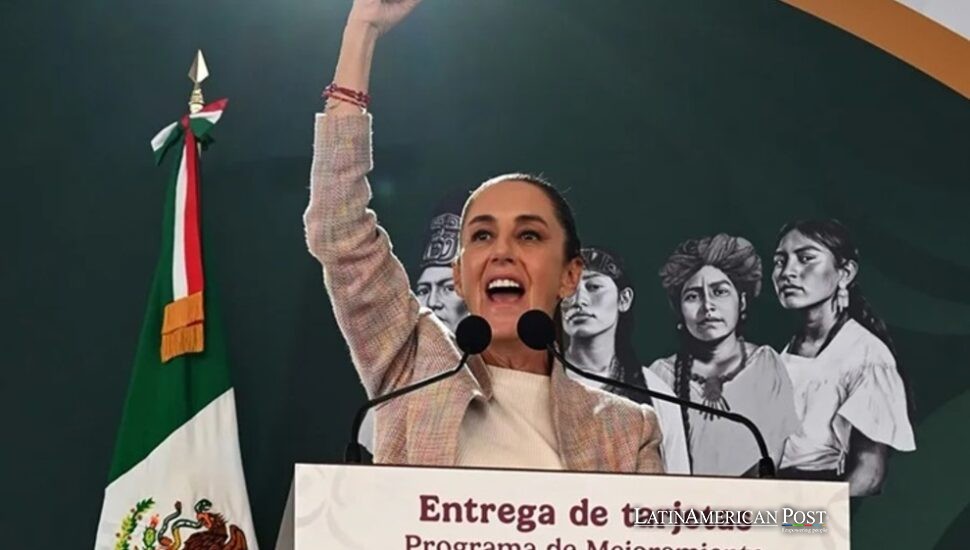México Triumphs Through Trump’s Global Tariff Turmoil

While global markets reeled from new U.S. tariffs, México emerged unexpectedly victorious, buoyed by an exemption that lifted its stock exchange and strengthened its currency. Officials and analysts see an opportunity for México to harness these circumstances and fortify its economy.
A Surprising Upswing for México
Amid widespread market losses triggered by U.S. President Donald Trump’s latest tariff announcement, México enjoyed a sudden boost. The main index of the Mexican Stock Exchange rose 0.54%, while the peso appreciated by 2.56%, closing near 19.94 pesos to the dollar. These figures contrast sharply with the downturns elsewhere, such as 4% to 6% drops on Wall Street, a steep fall of nearly 4% in Toronto, and 3% declines in much of Europe.
Several factors contribute to México’s unexpected gains. Foremost is the country’s exemption from the universal 10% “commercial tax,” a measure the White House introduced for other nations. President Claudia Sheinbaum expressed gratitude throughout the day, highlighting the significance of México’s special treatment under the Treaty between México, the United States, and Canada (T-MEC). For Sheinbaum, it offers proof that the commercial relationship between these neighbors remains a cornerstone—one that has spared Mexican exports from the most punitive measures aimed at steel, aluminum, or automotive goods from specific regions.
Market experts quickly recognized the advantage for México. While other countries face higher tariffs, México can fill that space with minimal barriers. Trading partners like the European Union, China, and parts of South America must contend with steeper duties, up to 34%. México, by contrast, retains preferential status. Experts believe this unfair situation can benefit some because it could encourage “nearshoring” – as overseas firms want to move creation to a duty-free place. It may be a practical way to get around the taxes. But this situation is not fair to all.
However, some caution that the celebratory mood could be tempered if the U.S. decides to broaden or revise its tariff structure. Historically, Trump’s administration signaled that any deviation from what it sees as “fair practice” could lead to fresh taxes—even for T-MEC signatories. México’s leaders hope that continuing dialogue will stabilize the bilateral arrangement, although they concede that remaining on good terms with Washington is crucial in these volatile times.
Policy Shifts and the Road Ahead
Government officials point to emerging opportunities that might stimulate México’s manufacturing and export-oriented economy. Secretary of Economy Marcelo Ebrard explained that while certain products still bear duties—especially where content is deemed insufficiently North American—the overall tariff load is far lighter than for nations outside T-MEC. This scenario, Ebrard stressed, makes México a beautiful place to conduct business, underscoring the plan to “maximize comparative advantages.”
Key business sectors now stand to benefit. Auto parts suppliers, electronics producers, and consumer goods manufacturers have all reported ramped-up inquiries from global firms looking to reposition supply chains. One crucial instance involves the steady effort of tech firms that aim to get around coming taxes through product building in México. Some overseas financiers regard a current release as permission to grow in Monterrey, Guadalajara, or the Bajío area – these actions develop the nation’s present industry.
But the route ahead may involve issues. México still doubts how strongly the United States will carry out extra payments if it sees a rush of switched global items. The White House gives México a tactical benefit, although it declares an “America First” story, making some doubt this deal’s endurance. President Sheinbaum’s repeated thanks to Trump highlight both an attempt to maintain cordial ties and the precariousness of the privilege México enjoys: a single policy shift could reshape the entire landscape.
Looking back, México’s brush with potential tariff hikes is nothing new. Over the years, U.S. presidents have occasionally threatened levies on Mexican products during negotiations, with automotive and agricultural sectors often caught in the crossfire. In past standoffs—such as the mid-1990s meltdown surrounding NAFTA—Mexican leaders scrambled to secure deals that safeguarded supply chains. In each instance, strains challenged the endurance of the two-sided tie. This newest situation highlights that the play of shared gain sometimes counters tough separatist leanings – furthermore, it demonstrates the bond’s complex dynamic.
Fostering Investment in the Face of Global Slumps
Worldwide financial places, not in México, have cause for concern. Wall Street indexes fell over 4 %, and Canada’s TSX composite suffered its biggest single-day loss in five years—these outcomes showed investor worry about reduced business potential. Key European exchanges in Frankfurt, London, and Paris showed nearly 3 % decreases, thus emphasizing a widespread departure from risks. In these conditions, México’s modest half-point climb in stock values is nothing short of remarkable.
Analysts propose that the country leverage its current advantage to attract long-term foreign direct investment (FDI). A Bank of México study indicates that even a minor shift in global supply chains could boost México’s industrial output by up to 1.5% annually. A BBVA México report indicates that nearshoring, moving production nearer to the U.S., may rise if foreign factories switch away from regions with high tariffs, for example, China or the EU. Though this shift relies on firm regulations and changes inside the country, it could soon improve México’s economy.
But dangers exist. Some of México’s sales abroad, especially steel plus aluminum, have partial tariffs or tariffs with strings attached. Because of the strict origin rules within T-MEC – local companies must carefully record the North American part of their items. A shortage could start increased charges, also cutting México’s edge. Observers note that for México to seize this moment fully, it must streamline customs procedures, invest in logistics infrastructure, and further refine workforce training—particularly in advanced manufacturing sectors.
President Sheinbaum has championed the so-called “Plan México,” aiming to fortify national production while capitalizing on the present environment. She imagines bigger groups of factories, like car plants, that use many local parts along with growth in farm exports. A key piece of her scheme is to continue a good relationship with Washington. Burnt before Mexican leaders plan to ensure they earn commerce benefits – they often mention “dialogue” and “respect.”
Gains in Uncertain Times
For now, the data paints a picture of cautious optimism. México’s main stock index ended the tumultuous session at 54,089 points—its best close in months—while the peso’s appreciation helps quell inflationary worries. This might demonstrate a temporary surge. Certain company heads perceive a larger change within worldwide business patterns. México becomes a steady plus affordable choice when compared to other areas hit by tariffs.
Regarding global exchange, México’s location within T-MEC provides special protection from protectionism’s immediate consequences. This advantage depends on political agreement. As U.S. presidential elections or abrupt policy adjustments are possible, México must alter terms or protect its favorable status at any time.
A strong message sounds true: México’s toughness still creates surprise. Through decades of changed trade situations—from the original NAFTA discussions to current T-MEC issues—México utilized its location, solid production, and diplomatic efforts to withstand trials.
Also Read: Trump’s Tariff Earthquake Rattles Latin America’s Trade Balance
Currency profit and stock increase showcase deep flexibility. Keeping pace requires using immediate advantages, investing in competition, branching commerce alliances, and carefully guiding White House inconsistencies—because, within the changing global economy, a benefit can fade without thoughtful development.




